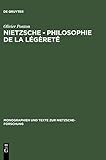Nietzsche - Philosophie de la légèreté / Olivier Ponton.
Material type: TextSeries: Monographien und Texte zur Nietzsche-Forschung ; 53Publisher: Berlin ; Boston : De Gruyter, [2008]Copyright date: ©2007Description: 1 online resource (343 p.)Content type:
TextSeries: Monographien und Texte zur Nietzsche-Forschung ; 53Publisher: Berlin ; Boston : De Gruyter, [2008]Copyright date: ©2007Description: 1 online resource (343 p.)Content type: - 9783110193466
- 9783110204322
- 171.2092 739.2209363
- B3318.E9P66 2007 B3318.E9
- online - DeGruyter
- Issued also in print.
| Item type | Current library | Call number | URL | Status | Notes | Barcode | |
|---|---|---|---|---|---|---|---|
 eBook
eBook
|
Biblioteca "Angelicum" Pont. Univ. S.Tommaso d'Aquino Nuvola online | online - DeGruyter (Browse shelf(Opens below)) | Online access | Not for loan (Accesso limitato) | Accesso per gli utenti autorizzati / Access for authorized users | (dgr)9783110204322 |
Frontmatter -- Table des matières -- Introduction -- I. La légèreté grecque -- II. La légèreté des choses humaines -- III. L’innocence du devenir -- IV. L’embellissement de la vie -- V. La libération de l’esprit -- Conclusion -- Backmatter
restricted access online access with authorization star
http://purl.org/coar/access_right/c_16ec
Nietzsche’s philosophy is a philosophy of lightness, a lightness which doesn’t consist in breaking with gravity but in controlling it: being light is being able to take charge of life, ie bearing and loving it, wanting it.This book is first devoted to Greek lightness for Nietzsche finds in Ancient Greece the pattern for an alleviation which enables to unload one’s drives without denying oneself. The study of Greek culture is thus the starting point of a close analysis of the “human, all-too-human” things, ie an inquiry whose orientation is definitely antimetaphysical, ie antiplatonic, antischopenhauerian and antiwagnerian: Nietzsche first shows that alleviation in religion has a “double face”: on the one hand, religion makes man’s heart heavy with sinfulness; on the other hand it lightens it with the fiction of a merciful God. True alleviation thus consists in freeing oneself from religious lightening, and proclaiming the radical innocence of everything. Nietzsche also criticizes alleviation in art, ie a romantic alleviation. He shows that – like alleviation in religion – it requires a previous heaviness. Therefore he praises a classical art and an aesthetic of lightness. Nietzsche eventually focuses on a philosophical alleviation of life, defined as a freeing of spirit. Such a definition leads him to develop the “doctrine of the closest things”, which consist of the organization of a dietary alleviation of life.
Issued also in print.
Mode of access: Internet via World Wide Web.
In French.
Description based on online resource; title from PDF title page (publisher's Web site, viewed 28. Feb 2023)


